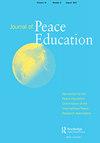Female Russian migrants in Norway and their stories about International Women’s Day
IF 1.3
Q3 EDUCATION & EDUCATIONAL RESEARCH
引用次数: 0
Abstract
ABSTRACT Although political relations between Russia and Norway have softened over the years, the symbolic boundaries persist. In this article, we illustrate how Russian female migrants in Northern Norway relate to these symbolic boundaries. Thus, perspectives from the phenomenology of the body and critical phenomenology are used to analyze qualitative data on how Russian female migrants experience the celebration of March 8, widely known as International Women’s Day, as a transnational space where they feel both belonging and non-belonging. More specifically, we explore the following research questions: How do Russian female migrants in Northern Norway use International Women’s Day as an occasion to express Russian femininity, or even Russian feminism, in their own way? And what can we, through a political-historical contextualization of these March 8 narratives, learn about the Norwegian majority and how the majority, often in subtle ways, represent women from outside the West, including Russians, as ‘the other’? It is our goal that this article will inspire readers to become more sensitive to racialization processes in our communities by becoming more aware of ‘ourselves’, and how we, through various narratives, reproduce inclusion and exclusion processes.在挪威的俄罗斯女性移民和她们关于国际妇女节的故事
尽管近年来俄罗斯和挪威之间的政治关系有所缓和,但象征性的边界依然存在。在本文中,我们将说明挪威北部的俄罗斯女性移民与这些象征性边界的关系。因此,从身体现象学和批判现象学的角度来分析定性数据,分析俄罗斯女性移民如何体验3月8日的庆祝活动,这被广泛称为国际妇女节,作为一个跨国空间,她们感到归属感和非归属感。更具体地说,我们探讨了以下研究问题:挪威北部的俄罗斯女性移民如何利用国际妇女节作为一个场合,以自己的方式表达俄罗斯女性气质,甚至是俄罗斯女权主义?通过3月8日这些叙事的政治历史背景,我们能了解到挪威的大多数人,以及大多数人如何以微妙的方式将西方以外的女性,包括俄罗斯女性,视为“他者”?我们的目标是,这篇文章将激发读者对我们社区的种族化过程更加敏感,通过更多地了解“我们自己”,以及我们如何通过各种叙述再现包容和排斥过程。
本文章由计算机程序翻译,如有差异,请以英文原文为准。
求助全文
约1分钟内获得全文
求助全文

 求助内容:
求助内容: 应助结果提醒方式:
应助结果提醒方式:


